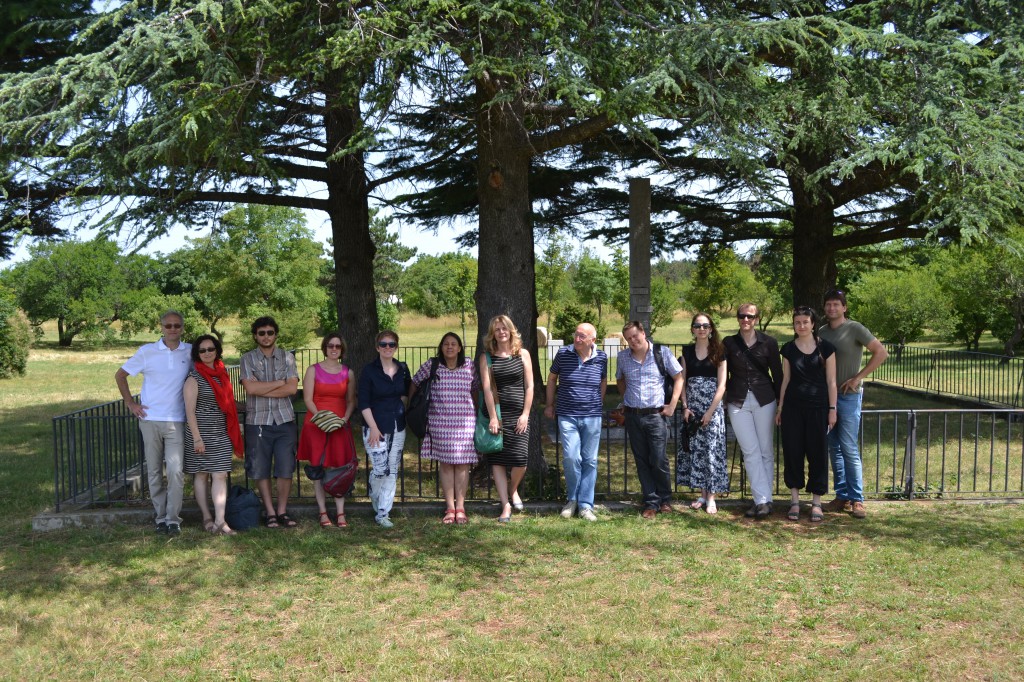Photo: Participants of the Humboldt-Kolleg ‚Memories in Translation‘. From left to right:
Ralph Buchenhorst (University of Halle), Erica Lehrer (Concordia University), Gaetano Dato (University of Trieste), Cynthia Milton (University of Montréal), Maike Lehmann (University of Cologne), Sina Emde (Free University Berlin), Ksenija Bilbija (University of Wisconsin-Madison), Joze Pirjevec (University of Primorska), Michael Meng (Clemson University), Kathryn Densford (George Washington University), Walter Sperling (Ruhr University Bochum), Magdalena Waligorska (University of Bremen), Borut Klabjan (University of Primorska, Koper) at the Memorial of the Heroes of Bazovica.
The workshop „Memories in Translation: An Interdisciplinary Workshop on Multidirectional Memory“, organized by Borut Klabjan, Magdalena Waligorska, and Cynthia Milton, and financed by the Alexander-von-Humboldt-Kolleg, was a one of a kind event. Organization was perfect, scholars thoughtfully selected and complementing each other beautifully, and the excursions added a lot of useful local history and remembrance to the presentations and discussions. Especially the field trip to Trieste made us understand the multi-layered and several times reinterpreted history of the Friuli region. Memorials of the Partisan movements mingled with communist monuments and memorial sites for the victims of National Socialism. On this trip, we were explained that Slovenian and Italian memory of the victims of Nazism and Italian Fascism are a contested field with controversial interpretations of past suffering, especially in the case of the so called “Foibe of Basovizza” in the Italian-Slovenian border region. It was in my early years as a student that I first came across the Friuli region, in a poem by Paul Celan called “Eine Gauner- und Ganovenweise” (A Rogues’ and Swindlers’ ditty), where the poet combines memories of his birthplace Czernowitz with anti-semitism in Germany and Trieste as a refugee site for Jewish Austrians during the Nazi dictatorship. The workshop added more important pieces to this multi-facetted history. Thank you very much!
– Ralph Buchenhorst (University of Halle)
Being one of the few anthropologists among many historians at the Koper workshop, I was made aware once again how important it is to talk across disciplines and regions. My research does not focus on Europe. I profited immensely, not only from the insights into memories of war and violence in Europe, but also from the contested memories and histories of the young nation of Slovenia and the Italian-Slovenian borderlands. The importance of the materiality of memory not only for states but also for citizens in this Southern European context was especially revealing. Where I work, in Fiji and Cambodia, memorials are built by governments to establish hegemonic national memories among its citizens. Grass root memorialization and contestation of these state historiographies takes place in rituals, ceremonies and private narratives, through spirit possessions, mediums and ghosts. But in the Slovenian-Italian borderspaces, memorials embody the political struggles of past and present of the region and its people. That was fascinating. From my background I still wondered about nonmaterial forms of remembering in this area. Is everything channeled into memorials or do people have other forms of collective remembering as well? What about the ghosts of the past? Do they still haunt the survivors and next generations just as they do in the new Polish crime literature that takes place in former Jewish spaces in Poland?
There were only a few papers from a non-European context, but all from a post-conflict setting. While they focused on art and literature in post-conflict Latin America, they nevertheless made me wonder: How do all these forms and practices of remembering travel globally in processes of postconflict transformation and when and how are they accepted or rejected in various local contexts and by whom?
This was a very fruitful and stimulating workshop and I gained many insights and new ideas. Thank you once again and I very much hope we can meet in the future again.– Sina Emde (University of Heidelberg)
